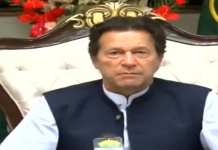ISLAMABAD: Prime Minister Nawaz Sharif on Monday termed honour killing a despicable act, saying it was his government’s highest priority to empower women and end violence against them in the society.
Addressing at the launch of a documentary by Oscar award-winning filmmaker Sharmeen Obaid-Chinoy, the prime minister expressed his firm resolve to build a progressive Pakistan by giving an equal and respectable status to women.
The film, ‘A girl in the river: The price of forgiveness’, which has been nominated for 88th Academy Awards, was screened at the Prime Minister’s Office to highlight the issue of honour killing at the government level.
The prime minister said the launch of documentary from his office was a manifestation of the government’s firm resolve to address the issue of honour killing, which had nothing to do with religion. He mentioned a saying of Holy Prophet Muhammad (Peace Be Upon Him) that regards the most honourable man as the one who shows respect towards women. “There is no honour in honour killing,” he said, adding that he was proud that a daughter of Pakistan through her art of filmmaking was contributing towards the betterment of society by working on challenging themes. “Sharmeen is a proud daughter of Pakistan. The struggle for women rights has always been challenging, but nothing can justify the oppression against women,” he said.
The prime minister reiterated that there should be no discrimination on the basis of creed, colour or caste in the Pakistani society. “It is the government’s priority to ensure women rights, and the government will take administrative measures against honour killings,” he said.
Later talking to journalists after watching the film, the prime minister said the society’s mindset about honour killings must be changed. The issue needed to be highlighted at various platforms to create awareness among the masses, he added. Nawaz Sharif said he was keen to provide women a level-playing field in accordance with the vision of the Quaid-e-Azam for the development and prosperity of country.
Sharmeen Obaid-Chinoy told the gathering that women were the greatest assets of Pakistan with their diverse potential ranging from scaling highest peaks of the world to proving their mettle in sports, or working strong as parliamentarians, lawyers and scientists.
Despite all these strides, she said the women were being subjected to the incidents of honour killing and acid throwing. She stressed working hard together to pave the way for strong legislation against honour killing, which she termed as ‘premeditative murder’.
Talking to APP, Chinoy said in the patriarchal society, the women were being killed in the name of honour by their blood relatives, mostly fathers and brothers. She said Islam gives rights to women to choose their partners for the sacred act of marriage and mentioned that the Nikkah (nuptial agreement) emphasizes on seeking the consent of the bride thrice to ensure that the marriage is not against her wishes.
She strongly recommended prosecution of murderers involved in honour killing so that the killers of a daughter or a sister do not go scot-free. She dismissed the impression that her movies are generally meant for international audience and said highlighting the issue related to the women of Pakistan was very much relevant with this society.
Sharmeen said her film would be screened in April at a national television channel and said she was optimistic that her efforts would go a long way in bringing a positive change in the society.
Bella Evidente, Country Programme Manager of UN Human Settlement Programme who attended the event, told APP that a critical subject had been addressed for which Sharmeen deserved commendation.
The documentary film ‘A Girl in the river: The price of forgiveness’ is about a young girl who is shot and thrown in river by her father on marrying a boy of his choice. The girl who survived by chance is forced to forgive her attackers owing to the social pressure.
The event was attended by Finance Minister Ishaq Dar, Defence Minister Khwaja Asif, ministers of State for Information Technology Anousha Rehman and of health Saira Afzal Tarar, Prime Minister’s Special Assistant on Foreign Affairs Tariq Fatemi, envoys including Chinese Ambassador Sun Weidong and human rights activists.












